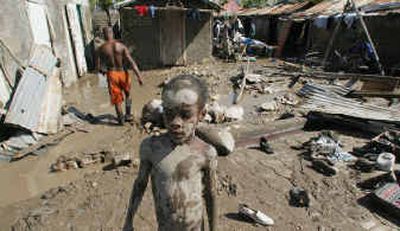Jeanne buries Haiti town in contaminated water

GONAIVES, Haiti – Blood swirled in knee-deep floodwaters as workers stacked bodies outside the hospital morgue Tuesday. Carcasses of pigs, goats and dogs and pieces of smashed furniture floated in muddy streams that once were the streets of this battered city. Desperate people swarmed a truck delivering water.
The death toll across Haiti from the weekend deluges brought by Tropical Storm Jeanne rose to 700, with at least 600 of them in Gonaives, and officials said they expected to find more dead and estimated tens of thousands of people were homeless.
Waterlines up to 10 feet high on Gonaives’ buildings marked the worst of the storm that sent water gushing down denuded hills, destroying homes and crops in the Artibonite region that is Haiti’s breadbasket.
Floodwaters receded, but half of Haiti’s third-largest city was still swamped with contaminated water up to two feet deep four days after Jeanne passed. Not a house in the city of 250,000 people escaped damage. The homeless sloshed through the streets carrying belongings on their heads, while people with houses that still had roofs tried to dry scavenged clothes.
“We’re going to start burying people in mass graves,” said Toussaint Kongo-Doudou, a spokesman for the U.N. peacekeeping mission in Haiti. Some victims were buried Monday.
Flies buzzed around bloated corpses piled high at the city’s three morgues, where the electricity was off as temperatures reached into the 90s.
Only about 30 of the 250 bodies at the morgue of the flood-damaged General Hospital hade been identified, said Dr. Daniel Rubens of the International Red Cross. Many of the dead there were children.
“I lost my kids and there’s nothing I can do,” said Jean Estimable, whose 2-year-old daughter was killed and another of his five children was missing and presumed dead.
Dieufort Deslorges, spokesman for the civil protection agency, said he expected the death toll to rise as reports came in from outlying villages and estimated a quarter million Haitians had been made homeless.
More than 1,000 people were missing, said Raoul Elysee, head of the Haitian Red Cross, which was trying desperately to find doctors to help. The international aid group CARE said 85 of its 200 workers in Gonaives were unaccounted for.
“It’s really catastrophic. We’re still discovering bodies,” said Francoise Gruloos of the U.N. Children’s Fund.
The aid group Food for the Poor said the main road north from Gonaives was made impassable by the storm – it was unclear whether from mudslides or debris – and there were fears that hundreds of possible flood victims may be out of reach.
Brazilian and Jordanian troops in the U.N. peacekeeping mission sent to stabilize Haiti after rebels ousted President Jean-Bertrand Aristide in February struggled to help the needy as aid workers ferried supplies of water and food to victims.
Police said aid vehicles were being waylaid by mobs on the outskirts of Gonaives. One truck that made it to City Hall in the town center was swarmed by people who began throwing its load of bagged water into the crowd, setting off a melee. The driver finally sped off, bouncing people off the truck.
Addressing the U.N. General Assembly on Tuesday, Haiti’s interim president, Boniface Alexandre, pleaded for help.
“In the face of this tragedy … I appeal urgently for the solidarity of the international community so it may once again support the government in the framework of emergency assistance,” he said.
Several nations were sending aid including $1.8 million from the European Union and $1 million and rescue supplies from Venezuela. The U.S. Embassy announced $60,000 in immediate relief aid Monday, drawing criticism from Rep. Kendrick Meek, D-Fla., who called it “a drop in the bucket.”
Floods are particularly devastating in Haiti, the poorest country in the Americas, because it is almost completely deforested, leaving few roots to hold back rushing waters or mudslides. Most of the trees have been chopped down to make charcoal for cooking.